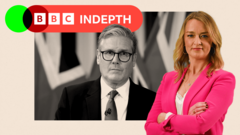Is the Prime Minister's Authority Under Fire Again?

Who is in Charge? Understanding the Dynamics of Political Authority
The question of authority within a government can often seem straightforward, but the reality is typically far more complex. In the case of the current Labour government under Sir Keir Starmer, this complexity has recently been underscored by internal party dynamics. With the dismissal of several backbench MPs who challenged the party's direction, the question of who holds the reins of power is once again under scrutiny. This situation highlights a broader issue within the government: the balance between leadership and internal dissent.
The Dilemma of Leadership
Expectations for a government are high, particularly after a change in leadership. Many believe that a party with a substantial majority should have no trouble asserting control and implementing its agenda. However, the reality is that the political landscape is fraught with challenges, from financial pressures to internal party conflicts. Sir Keir Starmer's recent actions, including expelling dissenting MPs, perhaps indicate a struggle to maintain authority and discipline within his ranks.
Internal Conflicts and Party Dynamics
The Labour Party, like any political organization, is made up of diverse opinions and interests. The recent discord among backbench MPs illustrates that maintaining unity is no easy feat. Sir Keir's decision to expel four MPs who had voiced opposition to government plans raises questions about his leadership style. Some party members may view this as a necessary measure to maintain discipline, while others might see it as an indication of weakness, suggesting that Starmer is unable to manage dissent effectively.
The Influence of Financial Markets
Another layer of complexity in governance comes from external pressures, particularly those exerted by financial markets. The government is acutely aware that maintaining the confidence of investors is crucial for economic stability. With the national debt reaching unprecedented levels, the implications of fiscal decisions are significant. Financial markets act as a barometer for governmental effectiveness, influencing policy decisions and shaping public perception.
Challenges of Governance
Governance is a multifaceted challenge that requires a clearly defined plan and the ability to execute it effectively. While the Labour government has made strides in outlining its priorities, the execution of those plans remains a hurdle. Internal frustrations among ministers suggest that while there may be a vision, the path to achieving it is unclear. The result can be a perception of chaos, with contradictory messages emanating from the government.
The Role of the Prime Minister
At the heart of this discussion lies the Prime Minister's role. Sir Keir Starmer is tasked with not only leading his party but also navigating the intricate web of public expectation, party loyalty, and external pressures. His leadership style will be scrutinized, especially as the next election approaches. The ability to convey authority and decisiveness is critical in maintaining the confidence of both the party and the public.
The Need for a Unified Strategy
Effective governance requires a unified strategy that resonates with both party members and constituents. A government that is perceived as disorganized or reactive may struggle to maintain public support. To enhance its credibility, the Labour government must focus on not only outlining its plans but also effectively communicating them to the public. This involves addressing concerns from backbenchers while also ensuring that the party's core message remains clear and consistent.
Public Perception and Political Reality
Ultimately, the question of who is in charge may boil down to public perception. Voter sentiments can significantly influence government actions and priorities. The Labour Party must be responsive to the electorate's needs and concerns, as public approval can make or break a government. As the political season progresses, the government will need to demonstrate that it is in control, not just of its internal dynamics but also of its relationship with the public.
Conclusion: The Power of Voters
In conclusion, while the immediate question of who holds authority within the Labour government is complex, it is ultimately the voters who wield the most power. Their responses to government decisions will shape the political landscape, influencing not only party strategies but also the future of governance in the UK. As the government faces increasing scrutiny and challenges, maintaining public trust and demonstrating effective leadership will be critical for the Labour Party's success moving forward.
FAQs
What led to the expulsion of Labour MPs from the party?
The expulsion was a response to those MPs who actively opposed various government proposals, as party leadership sought to maintain discipline among its ranks. This action reflects a broader challenge of managing dissent within the party.
How do financial markets influence government decisions?
Financial markets exert significant pressure on governments by shaping perceptions of economic stability. High national debt and the need for investor confidence often lead governments to make cautious fiscal decisions to avoid negative repercussions.
What is the importance of public perception in governance?
Public perception plays a crucial role in political authority. Voter sentiment can drive government actions and priorities, making it essential for leaders to maintain the trust and support of the electorate for continued success.
As political dynamics continue to unfold, one must wonder, how can governments balance internal dissent with the need for cohesive leadership? #PoliticalAuthority #LabourParty #Governance
```Published: 2025-07-19 12:40:04 | Category: sport


